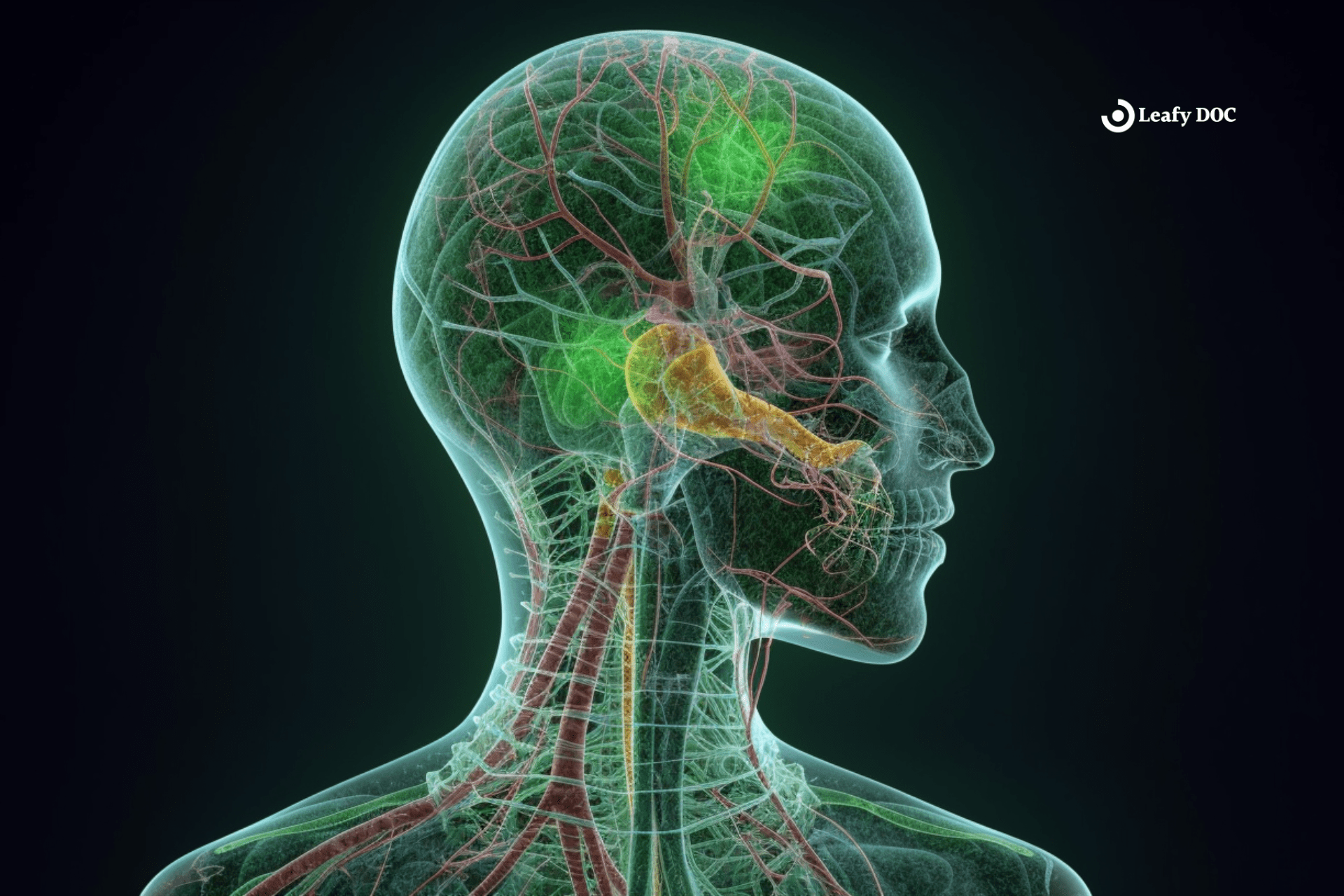7 Things To Know About The Human Endocannabinoid System
by Haley Mills · August 31, 2023
Join us as we reveal the secrets of the human endocannabinoid system! Unlock its incredible potential and revolutionize your understanding of the human body. Click now!

The human endocannabinoid system is a complex network of receptors and molecules that play a crucial role in maintaining balance and homeostasis within the body. It involves many physiological processes, including pain sensation, mood regulation, immune function, and appetite control. Understanding the endocannabinoid system is key to unlocking its potential therapeutic benefits.
This article will explore seven critical things to know about the human endocannabinoid system. We will delve into its structure and function, the role of endocannabinoids in the body, and the significance of cannabinoid receptors. Additionally, we will discuss the effects of cannabis on the endocannabinoid system and the potential health benefits associated with a well-balanced system. Finally, we will provide tips on supporting and maintaining a healthy endocannabinoid system. So, let’s dive in and discover the fascinating world of the human endocannabinoid system.
What is the Endocannabinoid System?
Now that you understand the basics of the human body, let’s dive into the incredible world of the endocannabinoid system and discover how it plays a vital role in your overall well-being. The endocannabinoid system (ECS) is a complex cell-signaling system in all mammals, including humans. It consists of three main components: endocannabinoids, receptors, and enzymes.
Endocannabinoids are molecules produced by the body that are similar in structure to cannabinoids found in the cannabis plant. The two main endocannabinoids are anandamide and 2-arachidonoylglycerol (2-AG). These molecules bind to cannabinoid receptors, which are found throughout the body. The two main types of cannabinoid receptors are CB1 receptors, primarily located in the brain and central nervous system, and CB2 receptors, primarily found in the immune system and peripheral tissues.
When endocannabinoids bind to cannabinoid receptors, they help regulate various physiological processes, including pain sensation, mood, appetite, sleep, and immune function. This is why the ECS is often referred to as a “master regulator” of the body. Additionally, the enzymes within the ECS break down endocannabinoids once they have completed their function, ensuring that the system remains balanced.
In conclusion, the endocannabinoid system is a fascinating and essential part of the human body. It helps regulate various physiological processes and plays a vital role in maintaining overall well-being. Understanding the basics of the ECS can provide valuable insights into how cannabinoids, both endogenous and exogenous, interact with our bodies and can potentially be used for therapeutic purposes.
How Does the Endocannabinoid System Work?
Imagine your body as a well-coordinated orchestra, with the endocannabinoid system acting as the conductor, ensuring that every instrument plays in perfect harmony to maintain balance and harmony within your body. The endocannabinoid system (ECS) is a complex network of receptors, enzymes, and endocannabinoids that are found throughout the body. Its main function is to regulate various physiological processes and maintain homeostasis, or a state of internal balance, within the body.
The ECS works by utilizing endocannabinoids, naturally occurring compounds similar in structure to the cannabinoids found in cannabis. These endocannabinoids bind to cannabinoid receptors, which are found on the surface of cells throughout the body. There are two main types of cannabinoid receptors, known as CB1 and CB2 receptors. CB1 receptors are primarily found in the brain and central nervous system, while CB2 receptors are mainly located in the immune system and peripheral tissues.
When the body is in a state of imbalance or stress, the ECS kicks into action to restore equilibrium. The endocannabinoids bind to the cannabinoid receptors and send signals to the body to regulate various processes such as pain perception, mood, appetite, and immune function. The ECS also plays a role in neuroprotection, as it helps regulate neurotransmitters’ release and protect against excessive neuronal activity.
Overall, the endocannabinoid system is a crucial component of our body’s ability to maintain balance and harmony. By understanding how it works, we can appreciate the intricate mechanisms that allow our body to function optimally and respond to various external and internal stimuli.
The Role of Endocannabinoids in the Body
Understand how endocannabinoids play a vital role in your body’s functioning. The endocannabinoid system maintains homeostasis in the body, which is the balance of various physiological processes. Endocannabinoids are molecules that are naturally produced by the body and bind to cannabinoid receptors, influencing a wide range of functions such as mood, appetite, pain sensation, and immune system response.
One of the main functions of endocannabinoids is to regulate neurotransmitter release in the brain. They act as retrograde messengers, meaning the postsynaptic neuron releases them and travel back to the presynaptic neuron to modulate the release of neurotransmitters. This process helps to maintain a balance in the brain’s communication and is crucial for proper brain function.
Endocannabinoids also play a role in regulating inflammation and immune system response. They are involved in modulating the release of cytokines, which are small proteins that regulate immune cell activity. Endocannabinoids can help regulate inflammation and contribute to the body’s response to injury or infection by influencing the immune system.
Endocannabinoids are essential to the human body’s endocannabinoid system and play a vital role in maintaining homeostasis. They regulate neurotransmitter release in the brain and help modulate inflammation and immune system response. Understanding the role of endocannabinoids can provide insight into the impact of cannabinoids from external sources, such as medical cannabis, on the body’s functioning.
The Importance of Cannabinoid Receptors
Explore the significance of cannabinoid receptors and their role in your body’s endocannabinoid system. Cannabinoid receptors are an essential part of the human endocannabinoid system, which plays a crucial role in maintaining homeostasis in the body. These receptors are found throughout the body, including the brain, immune system, and other organs. They are responsible for interacting with endocannabinoids, which are naturally produced by the body. When the body is in a state of imbalance, such as inflammation or pain, the endocannabinoid system activates to help restore equilibrium.
Cannabinoid receptors come in two main types: CB1 and CB2 receptors. CB1 receptors are primarily found in the brain and central nervous system. They play a significant role in regulating mood, memory, pain perception, and appetite. On the other hand, CB2 receptors are mainly located in immune cells and peripheral tissues. They are involved in modulating immune responses and reducing inflammation.
The interaction between endocannabinoids and cannabinoid receptors is essential for various physiological processes. Activation of these receptors can profoundly impact pain management, inflammation, immune function, and even mental health. Understanding the importance of cannabinoid receptors can lead to the development of targeted therapeutic approaches that harness the power of the endocannabinoid system to promote overall health and well-being.
The Effects of Cannabis on the Endocannabinoid System
When cannabis is consumed, it interacts with the endocannabinoid system, leading to various effects on the body. The main active compounds in cannabis, known as cannabinoids, bind to the cannabinoid receptors located in the body’s cells. There are two main types of cannabinoid receptors, known as CB1 and CB2 receptors. CB1 receptors are primarily found in the brain and central nervous system, while CB2 receptors are mainly located in the immune system and peripheral tissues.
When cannabinoids bind to these receptors, they can produce a range of effects. For example, THC, the primary psychoactive compound in cannabis, binds to CB1 receptors and can induce feelings of euphoria and relaxation. This is why consuming cannabis can produce a “high” or altered state of consciousness. On the other hand, CBD, another prominent cannabinoid in cannabis, does not bind strongly to CB1 receptors and does not produce psychoactive effects. Instead, it interacts with other receptors in the endocannabinoid system and has been associated with potential therapeutic benefits, such as reducing inflammation and anxiety.
The effects of cannabis on the endocannabinoid system can vary depending on the specific cannabinoids consumed, the dosage, and individual factors. It is important to note that while cannabis can have both recreational and medicinal uses, its effects on the endocannabinoid system are still being studied, and more research is needed to understand its potential benefits and risks fully.
Health Benefits Associated with a Balanced Endocannabinoid System
Balancing the endocannabinoid system can lead to numerous health benefits. The endocannabinoid system plays a crucial role in regulating various physiological processes in the body, such as mood, appetite, sleep, and immune response. When this system is in balance, it helps to maintain overall homeostasis and promotes optimal health.
One of the health benefits associated with a balanced endocannabinoid system is improved mood and mental well-being. Research has shown that the endocannabinoid system is involved in regulating the release of neurotransmitters, such as serotonin and dopamine, which are responsible for regulating mood. By balancing the endocannabinoid system, it can help alleviate symptoms of depression, anxiety, and stress, and promote a more positive and balanced mental state.
Another health benefit of a balanced endocannabinoid system is improved immune function. The endocannabinoid system plays a role in modulating the immune response, and when it is balanced, it can help regulate inflammation and immune cell activity. This can result in a strengthened immune system, making the body more resilient to infections and diseases.
Balancing the endocannabinoid system can profoundly impact overall health and well-being. By promoting a balanced endocannabinoid system, individuals can experience improved mood and mental well-being and enhanced immune function. Understanding the importance of the endocannabinoid system and taking steps to maintain its balance can lead to a healthier and happier life.
Tips for Supporting a Healthy Endocannabinoid System
To support a healthy endocannabinoid system, you can incorporate regular exercise, a balanced diet, and sufficient sleep into your daily routine. Exercise has been shown to increase endocannabinoid levels in the body, promoting overall health and well-being. Engaging in physical activity, such as cardio or strength training, can help stimulate the endocannabinoid system and improve its functioning.
In addition to exercise, a balanced diet is essential for supporting a healthy endocannabinoid system. Consuming a variety of nutrient-rich foods, including fruits, vegetables, whole grains, and lean proteins, can help provide the body with the necessary building blocks for endocannabinoid production. Including foods high in omega-3 fatty acids, such as fish or flaxseeds, can also be beneficial, as these fats are known to play a role in the functioning of the endocannabinoid system.
Lastly, sufficient sleep is crucial for maintaining a healthy endocannabinoid system. Lack of sleep has been linked to disruptions in endocannabinoid signaling, which can negatively impact overall health. Aim for 7-9 hours of quality sleep each night to support optimal endocannabinoid system functioning. Creating a bedtime routine, practicing relaxation techniques, and creating a sleep-friendly environment can help promote better sleep and support a healthy endocannabinoid system.
Conclusion
The human endocannabinoid system plays a crucial role in maintaining balance and homeostasis within the body. It is a complex system that involves endocannabinoids, cannabinoid receptors, and enzymes. By understanding how the endocannabinoid system works, we can better appreciate the effects of cannabis on the body and the potential health benefits associated with a balanced endocannabinoid system.
A healthy endocannabinoid system can be achieved through various means, such as regular exercise, a healthy diet, stress management, and adequate sleep. Additionally, incorporating cannabis or CBD products into one’s wellness routine may also provide benefits. However, it is essential to consult with a healthcare professional to ensure safe and appropriate use. The human endocannabinoid system is a fascinating and integral part of our physiology that continues to be studied and understood, offering potential avenues for therapeutic interventions and improved well-being.
Last Updated: August 8, 2024
Get Approved for Your Medical Marijuana Card in Minutes!

Get Your Medical Card
Connect with a licensed physician online in minutes

Like This Article?
Share with your friends
Table of Contents
Keep Reading
-
How Long Does Weed Stay In Your Blood
Curious about how long weed stays in your blood? Get the truth and debunk myths in this eye-opening article. Click now for all the facts you need!
-
Navigating the Medical Marijuana Registry Ohio: A Complete Guide
Explore the essential steps and insights on the medical marijuana registry in Ohio.
-
4 Steps to Cook with Pot for Pain Relief and Enjoyment
Learn how to cook with pot for pain relief and enhance your culinary experience.



